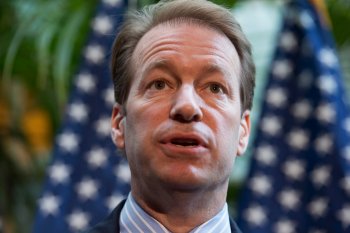Obama Reverses Himself and Takes Corporate Money for Second Inaugural
Barack Obama refused corporate donations for his first inaugural. The second time around, he changed his tune. By Ben Jacobs.
When Barack Obama is sworn into office for his second term on January 20, 2013, it will be very different than the ceremony four years ago. In a country still struggling economically and suffering deep partisan division, there will be far less hope and optimism than there was in 2009. There will be more of one thing though: corporate money.

President Barack Obama and first lady Michelle Obama leaves a reception in honor of the 2012 Kennedy Center Honors recipients, in the East Room of the White House in Washington, Sunday, Dec. 2, 2012. (Manuel Balce Ceneta / AP Photo)
In 2009, Obama refused to take any corporate donations for the presidential Inaugural. Although, by law, it is legal for corporations to give unlimited money to fund the inauguration and accompanying festivities, Obama refused, laying a marker down for what was supposed to be an administration held to a higher ethical standard. After all, corporations that gave huge sums of money before he was sworn in, might expect quid pro quos afterwards. This year though, as Politico first reported, the inaugural committee has reversed itself and will take direct corporate contributions.
Although the inaugural committee is imposing “a vetting standard” designed to filter out problematic contributions. However, the inaugural committee has not made clear what that standard is, besides the relative handful of companies that have yet to fully repay TARP money and donations from foreign individuals and corporations, which is against federal law for the inaugural committee to accept.
This change in policy met with outrage from campaign finance advocates. Fred Wertheimer, the President of Democracy 21, was distraught at what he saw as “an unnecessary step backwards for the administration.” He saw this decision as “the wrong thing to do, it allows corporations to curry favor with the administration by providing large sums to benefit the interests of the administration from companies that no doubt have major interest pending before government.” What made this particularly galling to Wertheimer was that “they ran an inauguration in 2008 without any of this money.”
There will be some limitations on donations that go beyond federal law. Inaugural spokesperson Addie Whisenhunt emphasized to The Daily Beast, “The Presidential Inaugural Committee will not be accepting donations from lobbyists or PACs and will not be entering into any sponsorship agreements with individuals or corporations.” But Robert Weissman, head of the advocacy group Public Citizen, found this distinction “not only meaningless [but] irrational.” In his opinion, “the conflicts of interest aren’t any different, take Bank of America or Verizon or Wal-Mart, those companies are not lobbying firms, so if they make a contribution it’s legal. But they’re going to expect exactly what a lobbying firm expects.”
It seems clear that this decision was based on concern that adequate money would be raised for the inauguration, which, “in keeping with precedent and in recognition of our nation’s ongoing economic recovery … will be smaller in scope than four years ago,” according to the inaugural committee. The Democratic National Convention in Charlotte had to be shortened by one day because of fundraising trouble, much of it because it refused to take contributions from corporations. With a much shorter window to raise money, it seems the inaugural committee is not worried about any sort of resulting moral taint.
Campaign finance reform opponents, though, are glorying in Obama’s flipflop on corporate money. Jim Bopp, a former Republican National Committee (RNC) member and perhaps the leading crusader against campaign finance laws in the United States, chuckled at Obama’s predicament. In his eyes, “it just demonstrates all this rhetoric that we’ve had to endure about corporations corrupting candidates and money being evil is just been demonstrated to be false.” He went to point out “Obama has been really one of the big perpetrators of that mythology so you could look at this as gross hypocrisy on his part or actually an admission that he never believed his rhetoric in the first place.”
Campaign finance reform opponents are glorying in Obama’s flipflop on corporate money.
To Bopp, this is win-win. Either Obama takes the unlimited corporate money and is not corrupted, “putting a lie to the reformer’s rhetoric” or Obama is shown to be “corrupted by his contributions,” a scenario that wouldn’t bother Bopp, a former advisor to Mitt Romney’s campaign.
Obama’s administration has seen an explosion of corporate money in politics. Much of this simply has to do with the fact that he was president when the Supreme Court decided Citizens United, as opposed to any action by the administration. In fact, Weissman notes sadly of the Obama White House that he doesn’t “even they think they did an adequate job” in promoting campaign finance reform. The one small step that the Obama administration could have made was setting the precedent of refusing corporate money for future inaugurations. It would not have been binding but would have persuasive power, when his successor is sworn into office in four years. But Obama backtracked. The result is that unlimited corporate donations are now once again a regular feature of presidential inaugurals and, barring congressional legislation, will not go away anytime soon.
Michael Tomasky: 'Hillary Is Going To Be The Top Tier In 2016'
With speculation already swirling about what Secretary Clinton will do next, Michael Tomasky joins The Ed Show and argues that Clinton should stay focused on foreign policy which will keep her above the fray, and that if she runs she will be the top candidate.
#Countdown
Budget Wars Begin

Obama’s Republican Buddy
Could Peter Roskam, who cut deals with the president back when they were cub state legislators, be a key GOP bridge to the White House?
State and Local
Not All Deductions Are Created Equal
Redistricting
It’s the Gerrymandering, Stupid
Back Tracking
Inauguration Accepts Big Money
Fiscal Cliff Edge
Obama Wins Again
Post-Election
Conservative Conversion

The Not-So-Liberal Future
Our population is aging—and statistics show many maturing voters turn conservative, says Michael Medved.
Striking Back
Obama’s Republican Revenge
Demand Peace
Why Obama Should Push For A Deal
Distinguished Record

The Forgotten Susan Rice
Why we easily forget Susan Rice’s indispensable role in bringing down Gaddafi.
Act, Already!

Is Immigration Reform Just Talk?
The proposed Achieve Act is a start toward moving beyond posturing and Band-Aids, says Mark McKinnon.












Comments